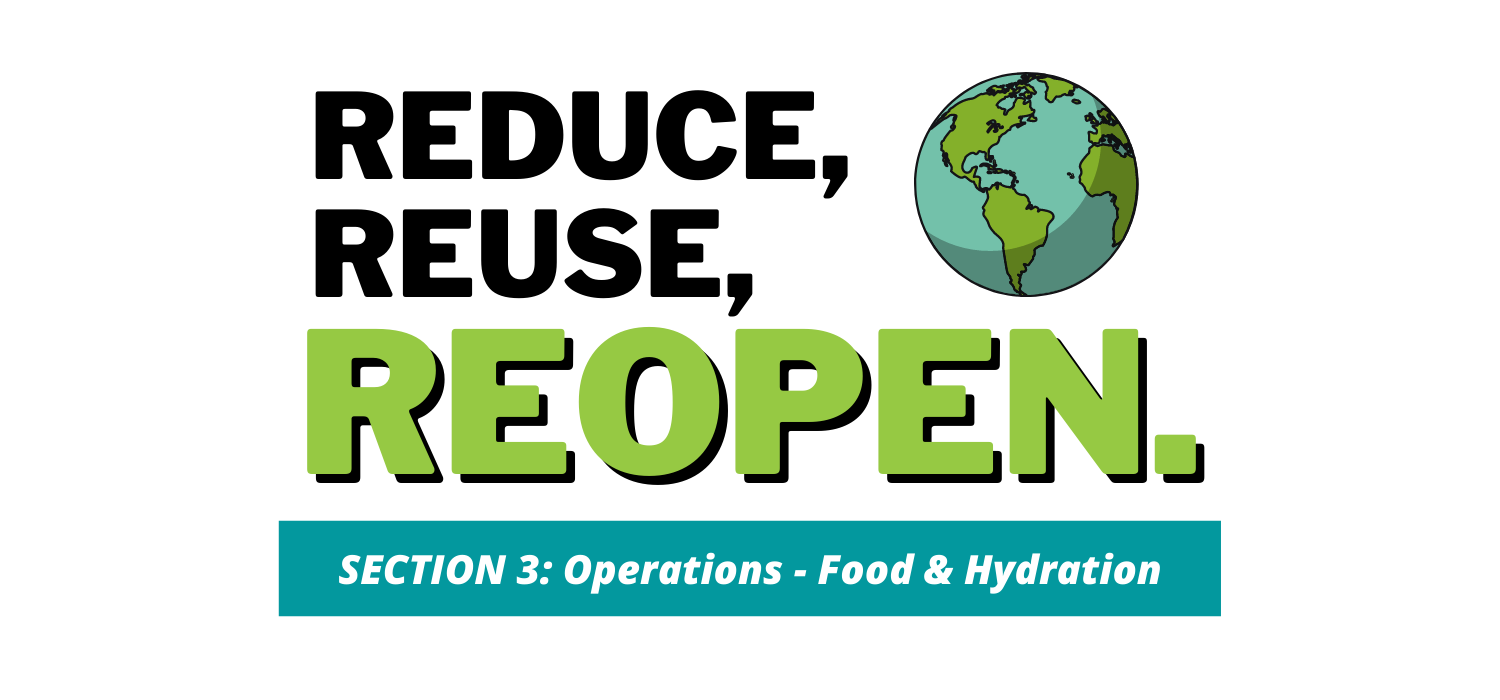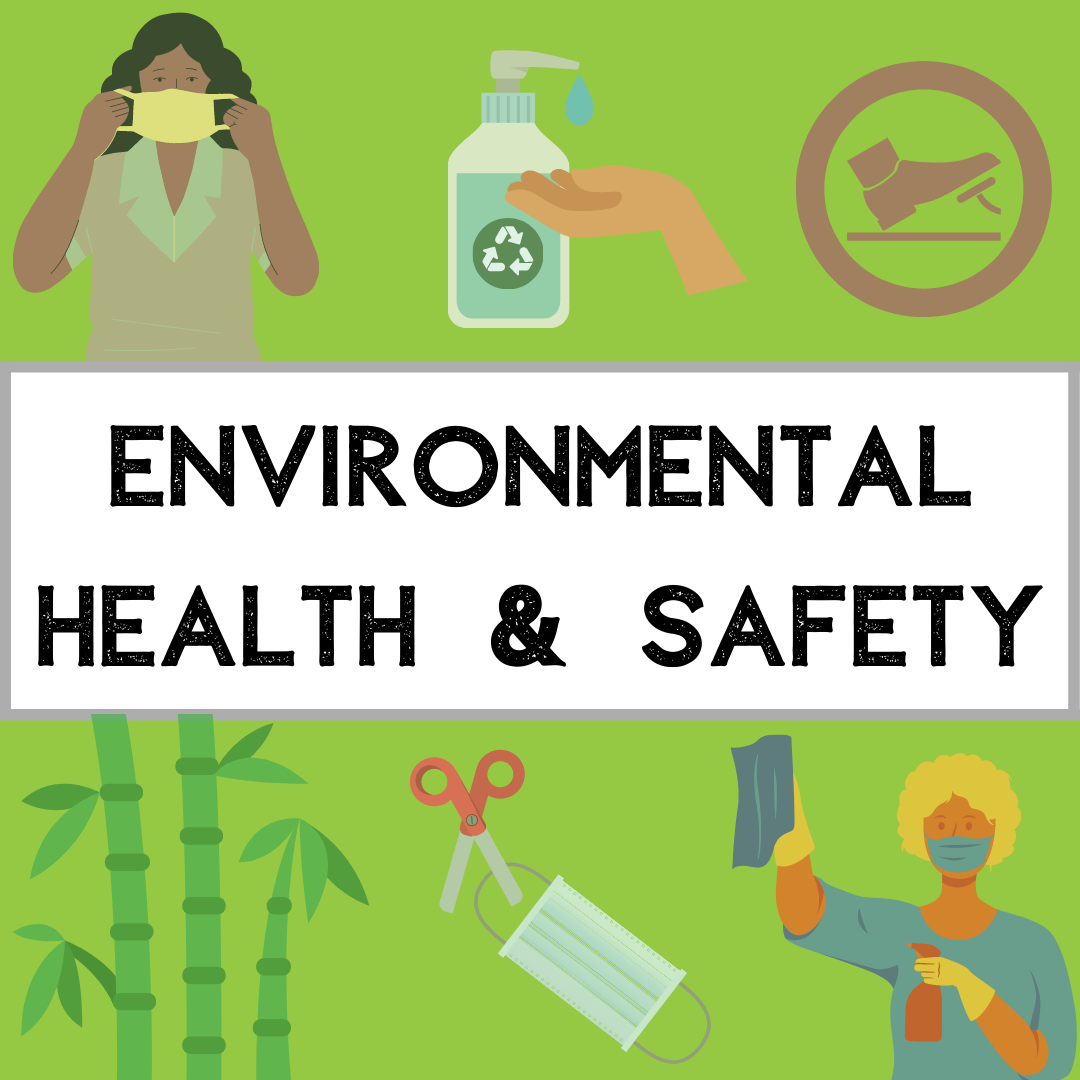cups & water bottles
| Current Situation | COVID-19 Challenge | Sustainable Solution |
|---|---|---|
| American single-use plastic consumption has grown by approximately 250-300% since the beginning of the pandemic (1). | Potential contamination of materials, whether single-use or reusable. | Utilize reusable items along with basic hygiene practices. These items are proven safe by over 125 virologists, epidemiologists, and health experts (2) and by WHO guidance (3). |
Sustainable recommendations and opportunities:
Encourage the use of personal reusable bottles, tumblers, mugs, and thermoses for all company members.
Purchase reusable bottles made primarily from stainless steel, glass, or BPA-free material over paper or plastic cups (4).
Shows and theatres can personalize bottles with custom branding to promote a commitment to sustainability.
Opt for larger bottles to limit the amount of daily refills.
Choose reusable bottles equipped for hot and cold beverages to decrease waste and save money.
If reusable is not an option, use single-use cup options that are recyclable and/or compostable within local waste management (Oceanic Global’s Greenwashing Guide). Recommended cup materials can be aluminum, paper, bamboo, and other materials depending on the local waste streams.
Recommended reusable bottle and single-use cup companies include:
water
| Current Situation | COVID-19 Challenge | Sustainable Solution |
|---|---|---|
| Concern about shared water sources is leading people to consider choosing single-use bottles instead. | Contaminated touchpoints and dispensers. | Opt for contactless water sources, or utilize water sources already in place and implement disinfectant procedures (5). |
Many Broadway theatres have made excellent progress toward this sustainable goal by installing plumbed lines. This is an opportunity to adapt the infrastructure in place to the current circumstance.
Sustainable Recommendations and Opportunities:
Install energy-efficient, contactless refillable water dispensers backstage.
If not done already, install plumbed lines to common water cooler locations, to avoid handling water jugs. This will also save on fuel consumption and space.
If water dispensers are not available, avoid purchasing water in single-use plastic bottles and opt for canned water, such as Ever & Ever: Still Water or Liquid Death: Still and Sparkling Water. Canned water is preferred over boxed water as aluminum is infinitely recyclable.
Recommended refillable water dispenser companies include:
cutlery
| Current Situation | COVID-19 Challenge | Sustainable Solution |
|---|---|---|
| Concern about contamination has led to increased use of single-use cutlery. From PPE, packaging, and single-use items used for food delivery and distribution, 2020 is on track to see a 30% increase in waste production from 2019 (6). | Contaminated surfaces of reusable cutlery. | Use reusable utensils - issue a personal set to each company member and require self-maintenance. “Reusable items that can be sanitized are safer than single-use items that have less contact traceability.” (7) |
Sustainable Recommendations and Opportunities:
Distribute or encourage the use of stainless steel, bamboo, or otherwise reusable cutlery to each company member, to be washed and maintained by each individual.
Shows and theatres can personalize utensil sets with custom branding to promote a commitment to sustainability.
If reusable cutlery is not an option, consider alternatives to plastic that are recyclable or compostable with your local waste stream management.
Recommended utensil sets include:
FOOD
| Current Situation | COVID-19 Challenge | Sustainable Solution |
|---|---|---|
| Concern about contamination is leading to increased single-serving and single-use food packaging. From PPE, packaging, and single-use items used for food delivery and distribution, 2020 is on track to see a 30% increase in waste production from 2019 (6). | Shared hospitality and food presents contamination risk. | Reduce the supply of food and hospitality in rehearsal and backstage. Encourage company members to bring in their own food and coffee, in reusable containers. |
When hospitality is required, consider the following sustainability practices:
Source food locally - eating locally is one of the most important considerations for sustainable food procurement. Choosing locally-sourced options and ingredients also mitigates the exposure risk from a long supply chain and frequent changing of hands (7).
Implement strategies to properly dispose of food scraps and waste. Keeping food and wood waste out of landfill will reduce methane emissions, a potent greenhouse gas and contributor to climate change (8). You can do this by composting with a company such as Royal Waste or by donating excess food to organizations such as DonateNYC, City Harvest, or Food Bank For New York City.
SOURCES
(2) Reusable Cups, Bags Safe to Use During Covid-19, Greenpeace Says
(3) From Oceanic Global: WHO Guidance for Food Business and WHO Guidance for the Accommodation Sector makes no recommendation to use disposable items other than cleaning products.
(4) Plastic, metal or glass: What’s the best material for a reusable water bottle?
(5) Stability of SARS-CoV-2 in different environmental conditions
(6) COVID-19 Pandemic Repercussions on the Use and Management of Plastics
Questions? Email the BGA: info@broadwaygreen.com



